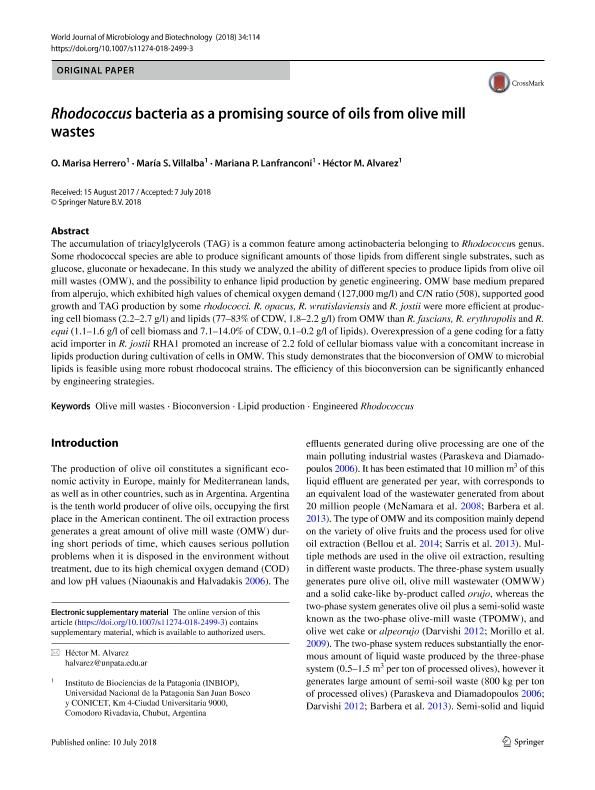Mostrar el registro sencillo del ítem
dc.contributor.author
Herrero, Ornella Marisa

dc.contributor.author
Villalba, María Soledad

dc.contributor.author
Lanfranconi, Mariana Patricia

dc.contributor.author
Alvarez, Hector Manuel

dc.date.available
2019-10-17T22:03:48Z
dc.date.issued
2018-08
dc.identifier.citation
Herrero, Ornella Marisa; Villalba, María Soledad; Lanfranconi, Mariana Patricia; Alvarez, Hector Manuel; Rhodococcus bacteria as a promising source of oils from olive mill wastes; Springer; World Journal of Microbiology; 34; 8; 8-2018; 1-10
dc.identifier.issn
0959-3993
dc.identifier.uri
http://hdl.handle.net/11336/86263
dc.description.abstract
The accumulation of triacylglycerols (TAG) is a common feature among actinobacteria belonging to Rhodococcus genus. Some rhodococcal species are able to produce significant amounts of those lipids from different single substrates, such as glucose, gluconate or hexadecane. In this study we analyzed the ability of different species to produce lipids from olive oil mill wastes (OMW), and the possibility to enhance lipid production by genetic engineering. OMW base medium prepared from alperujo, which exhibited high values of chemical oxygen demand (127,000 mg/l) and C/N ratio (508), supported good growth and TAG production by some rhodococci. R. opacus, R. wratislaviensis and R. jostii were more efficient at producing cell biomass (2.2–2.7 g/l) and lipids (77–83% of CDW, 1.8–2.2 g/l) from OMW than R. fascians, R. erythropolis and R. equi (1.1–1.6 g/l of cell biomass and 7.1–14.0% of CDW, 0.1–0.2 g/l of lipids). Overexpression of a gene coding for a fatty acid importer in R. jostii RHA1 promoted an increase of 2.2 fold of cellular biomass value with a concomitant increase in lipids production during cultivation of cells in OMW. This study demonstrates that the bioconversion of OMW to microbial lipids is feasible using more robust rhodococal strains. The efficiency of this bioconversion can be significantly enhanced by engineering strategies.
dc.format
application/pdf
dc.language.iso
eng
dc.publisher
Springer

dc.rights
info:eu-repo/semantics/openAccess
dc.rights.uri
https://creativecommons.org/licenses/by-nc-sa/2.5/ar/
dc.subject
BIOCONVERSION
dc.subject
ENGINEERED RHODOCOCCUS
dc.subject
LIPID PRODUCTION
dc.subject
OLIVE MILL WASTES
dc.subject.classification
Bioproductos, Biomateriales, Bioplásticos, Biocombustibles, Bioderivados, etc.

dc.subject.classification
Biotecnología Industrial

dc.subject.classification
INGENIERÍAS Y TECNOLOGÍAS

dc.title
Rhodococcus bacteria as a promising source of oils from olive mill wastes
dc.type
info:eu-repo/semantics/article
dc.type
info:ar-repo/semantics/artículo
dc.type
info:eu-repo/semantics/publishedVersion
dc.date.updated
2019-10-15T13:13:09Z
dc.identifier.eissn
1573-0972
dc.journal.volume
34
dc.journal.number
8
dc.journal.pagination
1-10
dc.journal.pais
Alemania

dc.description.fil
Fil: Herrero, Ornella Marisa. Consejo Nacional de Investigaciones Científicas y Técnicas; Argentina. Universidad Nacional de la Patagonia "San Juan Bosco"; Argentina
dc.description.fil
Fil: Villalba, María Soledad. Consejo Nacional de Investigaciones Científicas y Técnicas; Argentina. Universidad Nacional de la Patagonia "San Juan Bosco"; Argentina
dc.description.fil
Fil: Lanfranconi, Mariana Patricia. Consejo Nacional de Investigaciones Científicas y Técnicas; Argentina. Universidad Nacional de la Patagonia "San Juan Bosco"; Argentina
dc.description.fil
Fil: Alvarez, Hector Manuel. Consejo Nacional de Investigaciones Científicas y Técnicas; Argentina. Universidad Nacional de la Patagonia "San Juan Bosco"; Argentina
dc.journal.title
World Journal of Microbiology

dc.relation.alternativeid
info:eu-repo/semantics/altIdentifier/url/https://link.springer.com/article/10.1007%2Fs11274-018-2499-3
dc.relation.alternativeid
info:eu-repo/semantics/altIdentifier/doi/http://dx.doi.org/10.1007/s11274-018-2499-3
Archivos asociados
